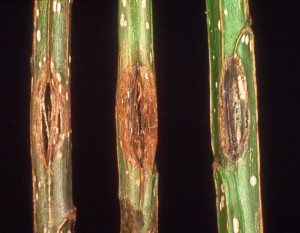A comparative fungal genome analysis could help bioenergy researchers develop disease-resistant poplar plantations.
The Science:
A team including DOE JGI researchers conducted a comparative analysis of two fungal tree pathogens to find out how one of them has gained the capability to significantly damage hybrid poplar plantations.

Cankers caused by the fungal tree pathogen M. populorum on poplar stems. (T.H. Filer Jr., USDA, Bugwood.org CC BY-NC-3.0)
The Impact:
The development of poplar plantations for biofuels production is threatened by the fungal tree pathogen M. populorum. Understanding just how this pathogen can infect and damage poplars is crucial for tree breeders and biofuels producers interested in harnessing sustainable plant mass for large-scale bioenergy applications.
Summary
Trees such as poplar and eucalyptus are considered candidate bioenergy crops, but they are not yet grown in plantations with the consistency of agricultural crops. The transition from a forest full of a variety of tree species to a plantation growing only a single tree species has raised concerns about tree pathogens that would not have been so damaging to the diverse trees in a wild environment. One such fungal tree pathogen is Mycosphaerella populorum, which causes stem deformations known as cankers. In a plantation full of susceptible hybrid poplars, this pathogen can cause tree trunk breakage, defoliation, and is now considered “the most important factor limiting poplar plantations in eastern North America.”
Published ahead online March 2, 2015 in the Proceedings of the National Academy of Sciences, a team including researchers from the U.S. Department of Energy Joint Genome Institute (DOE JGI), a DOE Office of Science user facility managed by Lawrence Berkeley National Laboratory, compared the genomes of M. populorum and its close relative M. populicola, a pathogen that causes leaf damage to a much smaller range of species, to learn more about how fungal tree pathogens adapt to different hosts and ecosystems. These fungal genomes had been previously sequenced by the DOE JGI.
Given the similarity between the two genomes, the team wondered if the number of copies of a given gene could help explain why one pathogen can cause cankers while the other does not. They also found a cluster of secondary metabolites resulting from a horizontal gene transfer to the M. populorum genome that gives it the ability to infect woody tissues, a capability M. populicola does not possess. The team noted that their findings identified genes that, “can have major impacts on tree domestication because it transforms an innocuous coevolved pathogen into one that causes serve mortality and economic damage to plantation forestry.” The characterization of these genes provides scientists targets for reducing or even eliminating the potential of this fungus to damage prospective bioenergy feedstocks.
Contact
Igor Grigoriev
Fungal Genomics Program Head
DOE Joint Genome Institute
ivgrigoriev@lbl.gov
Funding
- U.S. Department of Energy Office of Science
- Genomic Research and Development Initiative of Natural Resources Canada
- Genome Canada
- The Netherlands Organization for Scientific Research
- The Netherlands Genomics Initiative
Publication
- Dhillon B et al. Horizontal gene transfer and gene dosage drives adaptation to wood colonization in a tree pathogen. Proc Natl Acad Sci U S A. 2015 Mar 2. pii: 201424293. [Epub ahead of print] doi: 10.1073/pnas.1424293112